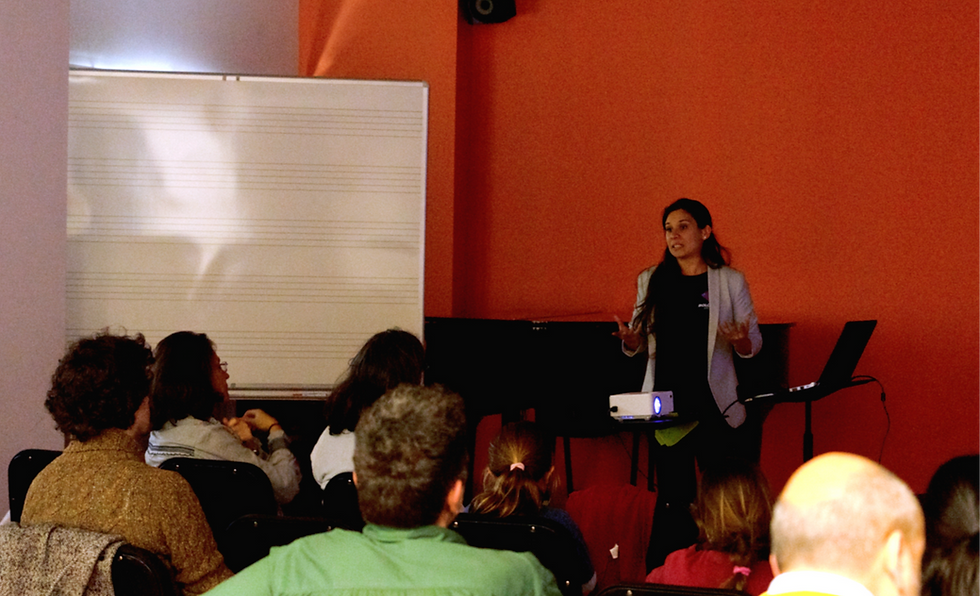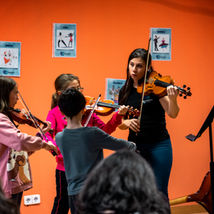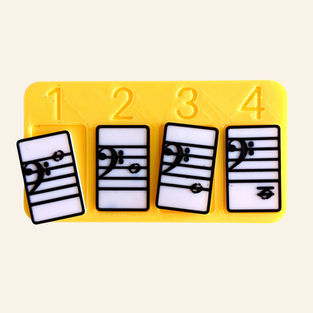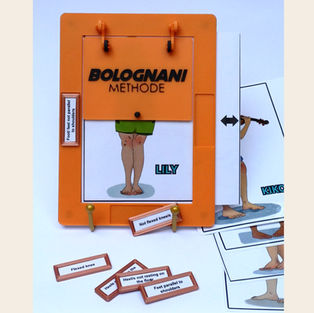
Integrated Learning
EXCEPTIONAL TEACHING
The Bolognani Method adopts an integrative approach, aiming to educate the child in a comprehensive way.
To achieve this, it organizes learning into four developmental areas: motor, socio-emotional, language, and cognitive.
As you teach your students to play the violin, the method guides you to stimulate each of these areas simultaneously.
You will not only be training violinists, but also respecting their developmental level and adapting to their unique way of learning.
The Bolognani Method guides you to identify which area is least stimulated and focus on strengthening it, as this can directly affect violin learning.
Every brain learns differently, and this methodology provides you with concrete tools to support that diversity.

FOUR DEVELOPMENTAL AREAS
MOTOR AREA
These are physical skills and are divided into two components:
-
Gross motor skills: large movements such as maintaining balance, coordinating both sides of the body, and adopting proper posture.
-
Fine motor skills: precise movements, such as using fingers independently and handling small objects.
It also includes key aspects such as laterality, visual-motor coordination, and motor planning.

SOCIO-EMOTIONAL AREA
These are the skills needed to recognize, understand, and manage one’s own emotions as well as those of others.
It also includes the ability to build empathetic relationships with others.
It is essential for functioning effectively within society.
It encompasses abilities such as emotional regulation, empathy, self-esteem, among others.

LANGUAGE AREA
This area covers the skills needed to understand, process, and produce language.
These skills enable a person to communicate, express ideas, emotions, desires, and thoughts.
Within the language area, aspects such as receptive and expressive language, phonological awareness, and pragmatics (knowing when and how to say something) are included.

COGNITIVE AREA
These are mental skills that allow us to acquire, process, understand, store, and use information.
They enable problem-solving, decision-making, and adaptation to new situations.
The cognitive area includes attention, memory, perception, reasoning, inner language, among others.


LEARNING THROUGH PLAY
PURPOSEFUL PLAY
Bolognani Method advocates teaching through play because without emotion, there is no learning.
When a child has fun, their brain opens up to learning, connects information more effectively, and retains it for longer.
Learning truly happens when it is connected to a positive emotional experience.
That’s why creating a safe, motivating, and playful environment is not a minor detail, but an essential condition.
What may seem like simple play to a child is actually a pedagogical tool.
Carefully designed materials so you can observe whether the four areas are developing in balance.
You will learn to identify your student’s developmental level through play.
Based on this assessment, you can use the games to strengthen areas that need more attention, turning play into an educational intervention.
neurodivergence
ANOTHER WAY TO LEARN
Invisible difficulties
Being neurodivergent means that the brain functions differently from what is considered "typical."
These differences can affect how a person learns, processes information, communicates, or interacts with others.
It is not a disease or something that needs to be fixed, but a natural form of human diversity.
Some examples of neurodivergence include autism, ADHD (attention deficit hyperactivity disorder), dyslexia, dyscalculia, and giftedness.
Bolognani Method teaches you to use its games to identify these warning signs and support your students with specific difficulties or creativity that is invisible to traditional eyes.

VIOLIN LESSONS
LEARN VIOLIN
WITH US
01
Trial lesson
It’s the first contact with the instrument.
Children need to experiment to discover what they truly enjoy.
This is an opportunity to have that first experience, get to know the environment, and most importantly, see if they enjoyed it and are eager to return the following week!
PRICES & INFO - 20 euros - Advance payment required - 30 minutes - Individual session - Violin included (up to 13 years old)
Enrollment
02
Enrollment is annual and guarantees the student’s spot for the start of the course.
In June, the student will have the opportunity to participate in the closing concert and will receive a diploma in recognition of their progress and commitment.
Additionally, they can register for the next course with a 30% discount!
PRICES & INFO - 75 euros - Reservation of a spot - Welcome bag - Participation in the concert (June) -Course completion diploma (delivered in June)
03
Weekly Lessons
The student will have a fixed day and time each week and will have homework to practice at home two to three times per week.
We advise the parents of young violinists to pick them up 5 minutes early to discuss how to practice at home.
Regular practice is key to making progress and enjoying the instrument!
Frequently Asked Questions
About
Valeria Bolognani
Hello, I’m Valeria. I was born in Argentina, continued my studies in Spain, and later in Vienna, always certain that my path would be connected to both music and teaching.
Since the age of five, I loved playing “teacher”: I would spend hours in front of my little chalkboard, teaching my imaginary students everything I learned at school.
Today, I dedicate my life to sharing music and guiding children in their learning, convinced that play is a fundamental pillar of education and should be respected, as, in my case, a child’s play can grow into an adult’s profession.

Education






VALERIA BOLOGNANI
2024 - 2025
Master’s Degree in Learning Difficulties and Disorders
2020 - 2024
2012-2018
Bachelor Degree Performance violin
Higher Conservatory of Music of Alicante, Spain


Foto Michael Harb
Foto Michael Harb
Professional Experience

- "The Method that Combines Play with Skill Development"
ISBN 978-6310073606
- "Music, Play, and Development"
ISBN 978-6310085333
Play and Place
Musical Lights
Musical Detective
Guess the Maestro
Arco-training
Fun Balance

Conferences
Buenos Aires, Argentina
Porto, Portugal
Valencia, Spain
Zagreb, Croatia
Vienna, Austria
Madrid, Spain
Amersfoort, Netherlands
Istanbul, Turkey
Violin and viola teacher
Bolognani Methode
MusikMomente
VHS
Pro-vo
Le Conservatorie


Orchestras
Landesorchester Burgenland
Österreich Koreanische Philharmonie
Junge Philharmonie Wien
Pro-Arte
Orchester der Stadt Wien
Oper im Berg, Salzburg
Philharmoniker der Universität Alicante
Junge Philharmoniker der Universität Valencia
International Vienna Orchestra

Prestigious Concert Halls
Partners
About
Francisco Lolli
I am Francisco Lolli, a 3D designer and electromechanical engineer born in Buenos Aires, responsible for developing the 3D educational materials for the Bolognani Method.
Being part of the Bolognani Method is truly motivating, and it is incredibly rewarding to see the unique pieces I design come to life in the hands of children, becoming genuine learning tools.







































